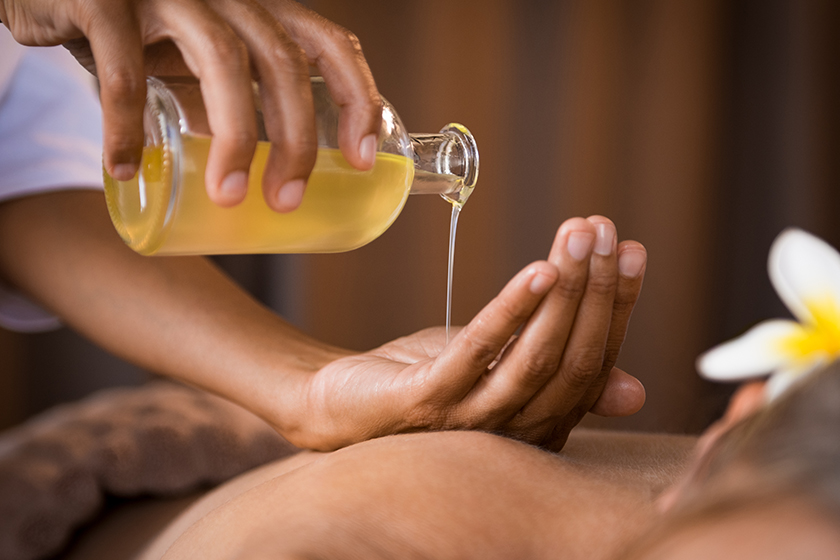
Abhyanga Therapy: Ancient Wisdom for Holistic Well-being
Introduction: In the realm of holistic healing practices, Abhyanga therapy stands as a revered and time-honoured technique originating from the ancient healing system of Ayurveda. With its roots in India, Abhyanga massage has been cherished for centuries as a profound method to promote relaxation, rejuvenation, and overall well-being. Combining the therapeutic benefits of touch, warm oils, and Ayurvedic principles, Abhyanga therapy offers a holistic approach to self-care and restoration. In this article, we delve into the essence of Abhyanga therapy, exploring its techniques, benefits, and the science behind its effectiveness.
What is Abhyanga Therapy? Abhyanga, which translates to "oil massage" in Sanskrit, is a full-body massage technique that involves the application of warm oils infused with herbs and essential oils. The practice is tailored to suit an individual's constitution and specific needs. During an Abhyanga session, rhythmic and flowing strokes are applied to the body, targeting energy points and channels, thereby promoting the flow of vital energy or "prana."
Techniques and Process: Abhyanga therapy is typically performed in a quiet, warm, and serene environment. The practitioner begins by selecting suitable oils based on the individual's dosha (constitution) and specific imbalances. The oils used can vary but commonly include sesame oil, coconut oil, or specialized herbal-infused oils.
The massage commences with gentle strokes, gradually building up to deeper pressure, and covers the entire body, including the scalp and soles of the feet. The strokes are directed towards the heart, following the flow of lymphatic and circulatory systems. This technique aids in promoting blood circulation, stimulating the lymphatic system, and assisting the body in eliminating toxins and waste materials.
Benefits of Abhyanga Therapy:
Relaxation and Stress Relief: The nurturing touch and warm oils used in Abhyanga therapy create a deeply relaxing experience. It helps soothe the nervous system, reduce stress, and anxiety, and promote a sense of calm and well-being.
Improved Circulation: The rhythmic strokes and warm oils of Abhyanga therapy enhance blood circulation, bringing vital nutrients and oxygen to the body's tissues and organs. This increased circulation also aids in the removal of metabolic waste, contributing to overall detoxification.
Rejuvenation of the Skin: The application of nourishing oils during Abhyanga therapy provides deep hydration to the skin, improving its texture, tone, and overall health. It can help alleviate dryness, promote a youthful glow, and provide a natural defence against external environmental factors.
Balancing the Doshas: According to Ayurveda, imbalances in the doshas (Vata, Pitta, and Kapha) can contribute to various health issues. Abhyanga therapy seeks to restore balance by harmonizing these energies, thus promoting overall well-being.
Muscle Relaxation and Pain Relief: The gentle yet firm strokes of Abhyanga therapy help relieve muscle tension, stiffness, and pain. It can be particularly beneficial for individuals experiencing joint discomfort or muscular fatigue.
Scientific Explanation: While Abhyanga therapy has been practised for centuries, the scientific understanding of its benefits is still evolving. Some of the mechanisms that contribute to the therapeutic effects of Abhyanga include:
a) Stimulation of the Parasympathetic Nervous System: The slow and rhythmic strokes of Abhyanga massage activate the parasympathetic nervous system, triggering a relaxation response in the body and reducing the effects of the sympathetic nervous system's "fight or flight" response.
b) Release of Endorphins: The massage stimulates the release of endorphins, the body's natural pain-relieving and mood-enhancing hormones. This release induces a sense of relaxation, contentment, and well-being.
c) Enhancement of Circulation: The massage techniques employed in Abhyanga therapy improve blood circulation, facilitating the delivery of oxygen and nutrients to the body's tissues, while aiding in the removal of waste products.
d) Nurturing Touch and Mind-Body Connection: The power of touch is deeply rooted in human psychology. The compassionate touch of an Abhyanga therapist can foster a sense of connection, emotional well-being, and overall relaxation.
Conclusion: Abhyanga therapy is a timeless gift from Ayurveda that offers a holistic approach to self-care, relaxation, and rejuvenation. Through the integration of warm oils, gentle yet purposeful strokes, and an understanding of individual constitutions, Abhyanga massage nurtures the mind, body, and spirit. While its benefits have been acknowledged for generations, further scientific research is needed to fully explore and validate the numerous advantages of this ancient practice. For those seeking a pathway to wellness that encompasses a deeper connection with oneself, Abhyanga therapy stands as a testament to the enduring wisdom of Ayurveda.
For an Appointment at Sukhayu Ayurveda and Panchakarma Centre Please Call on 7420004242




